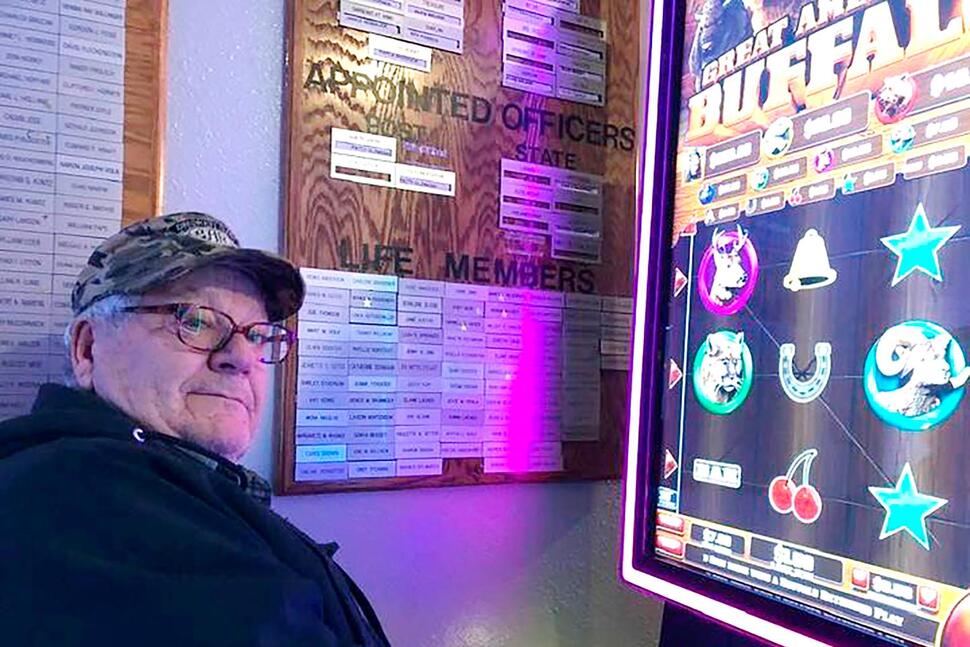
Louis Ressler plays an electronic pull tab machine at the AMVETS club in Bismarck, North Dakota, Tuesday, Dec. 7, 2021. The 72-year-old Army Vietnam veteran said he’s been playing the games at least twice weekly since they were introduced. North Dakotans poured more than $1.3 billion into electronic pull tab machines in fiscal 2021, a sum nearly double the amount in the previous fiscal year. (AP Photo/James MacPherson)
BISMARCK, N.D. (AP) — North Dakotans poured more than $1.3 billion into electronic pull tab machines in fiscal 2021, nearly double the amount spent in the previous fiscal year, state data shows.
According to the state Attorney General’s Office, which oversees gambling in the state, gamblers already have wagered more than $563 million in the first four months of the current fiscal year into the machines that mimic Las Vegas-style games.
Deb McDaniel, North Dakota’s top gambling regulator, believes pull tab activity should easily set another record again this year.
“We’re on track,” she said.
Lawmakers approved the games in 2017 but they were not launched until August 2018. There are now more than 3,700 machines at over 700 bars and other locations in 51 of North Dakota’s 53 counties, according to data provided by the state.
The coronavirus pandemic did nothing to slow the meteoric rise of “e-tabs” in the state, though other games of chance such as bingo cards, paper pull-tab tickets, blackjack and other games have experienced a 26% drop in activity from fiscal 2019 to $174 million.
North Dakota’s treasury banked more than $25.5 million in gambling taxes last fiscal year, or nearly double the amount collected in fiscal 2020, and three times the sum in fiscal 2019.
Charities will split an estimated $130 million this year, up from nearly $95 million in fiscal 2020, which was a 25% increase from the year before. That money funds everything from youth sports to programs for the needy.
The popularity of the games was on display Tuesday at the AMVETS club in Bismarck, where a handful of mostly older players were drawn to the brightly lit machines while other club members ate a hot beef lunch special.
Louis Ressler, a 72-year-old Army Vietnam veteran, said he has been playing the games at least twice weekly since they were introduced. He was up $100 from betting over the lunch hour Tuesday, but was losing ground quickly.
“I’ll take a little home today — you got to know when to quit,” he said.
Ressler, a widower and retired heating and air conditioner repairman, said almost everyone he knows plays the e-tabs, but that everyone ends up losing.
“I can count on one hand the guys I know who don’t play,” he said. “I know guys who say they are ahead in this game, but they really aren’t. You just don’t get ahead playing this.”
Ressler said he used to be a regular at a casino on the Standing Rock Reservation about an hour’s drive away from his home in Mandan but has only been there once since the electronic pull tabs came out.
“Why? I can go to any bar in this city and play now,” he said.
While the proliferation and popularity of the games has swelled the state’s coffers and been a boon for charities, it has also raised worries about gambling addiction and the impact on American Indian casinos.
The North Dakota Legislature this year required e-pull tabs and other charitable gambling to contribute $40,000 annually to gambling treatment programs. It previously was only funded by the state lottery at about $320,000 a year.
Lawmakers also funded seven additional positions in state government to help regulate the games.
McDaniel has said casinos on North Dakota’s five American Indian reservations are feeling the effect of electronic pull tabs, perhaps losing 60% or more of revenue. Tribes aren’t required to publicly disclose revenues.
Tribal leaders say casinos fund numerous social programs and are typically the top employers on reservations.
Legislation pushed by tribal leaders to limit the number of e-tab machines, and another bill to make them look less like slots, failed in the Republican-controlled Legislature this year.
